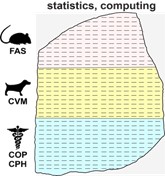Catalog

Pillar 1: Pathogenesis and Diagnostics
Pillar 2: Therapeutic Intervention
Pillar 3: Health Promotion and Disease Prevention
Our approach fits the bench-to-bedside–to-community paradigm through an integration of scientific, clinical and community knowledge. For our data core, these knowledgebases are essentially matrices of genomic, environmental and lifestyle data that often overlap across disciplines (Fig. 1). Our methods combine classical approaches in physical modeling, epidemiology and applied statistics with emerging techniques in artificial intelligence and data-science.
The Systems Modeling and Data Analytics Core (SMDA) supports all three POH Pillars as each domain faces similar data-challenges to realize the promise of personalized healthcare (Fig 1). Fortunately, solutions to these challenges have the potential to revolutionize translational research by:
Increasing the productivity of individual investigators (training)
Improving communication between disciplines
For example, investigators within the UGA colleges: Arts and Sciences (FAS), Veterinary Medicine (CVM), Pharmacy (COP) and Public Health (CPH), work with datasets on: genomics, therapeutic response, diet and environmental exposure. Better coordination of these data-analytics efforts has the potential to reduce duplicative labor, improve workforce training and enable new research that is clinically relevant and scientifically and statistically rigorous (Fig. 1).
About this item
The primary goal of the University of Georgia’s (UGA) Precision One Health (POH) initiative is to provide individual patients with the right medical care at the right time through better treatment and disease-prevention. The POH rests upon three pillars:
- Pillar 1: Pathogenesis and Diagnostics
- Pillar 2: Therapeutic Intervention
- Pillar 3: Health Promotion and Disease Prevention

Our approach fits the bench-to-bedside–to-community paradigm through an integration of scientific, clinical and community knowledge. For our data core, these knowledgebases are essentially matrices of genomic, environmental and lifestyle data that often overlap across disciplines (Fig. 1). Our methods combine classical approaches in physical modeling, epidemiology and applied statistics with emerging techniques in artificial intelligence and data-science.
The Systems Modeling and Data Analytics Core (SMDA) supports all three POH Pillars as each domain faces similar data-challenges to realize the promise of personalized healthcare (Fig 1). Fortunately, solutions to these challenges have the potential to revolutionize translational research by:
- Increasing the productivity of individual investigators (training)
- Improving communication between disciplines
For example, investigators within the UGA colleges: Arts and Sciences (FAS), Veterinary Medicine (CVM), Pharmacy (COP) and Public Health (CPH), work with datasets on: genomics, therapeutic response, diet and environmental exposure. Better coordination of these data-analytics efforts has the potential to reduce duplicative labor, improve workforce training and enable new research that is clinically relevant and scientifically and statistically rigorous (Fig. 1).
Speaker Information
Jonathan Mochel, Ph.D.
Dr. Jon P. Mochel obtained his Veterinary Medical Degree from the National Veterinary School of Alfort (Paris, France). He completed his Doctorate studying Neurosciences in collaboration with the College de France and received the Silver Medal from Paris XII for his work. Dr. Mochel holds a MS in Pharmacology and Pharmacokinetics and is a Diplomate of the European College of Veterinary Pharmacology and Toxicology (ECVPT). He completed his Ph.D at Leiden University (Netherlands), with a focus on the mathematical modeling of the cardiovascular system for optimization of ACE inhibitors dosing schedules in patients with congestive heart failure. He is a founder of the Animal Health Modeling & Simulation Society which aims at promoting the dissemination of mathematical modeling in Veterinary Sciences. Dr. Mochel is a Professor of Systems Pharmacology in the Department of Biomedical Sciences at Iowa State University and a Fellow of the American Academy of Veterinary Pharmacology and Therapeutics. He is an ad hoc Study Section Reviewer for the US National Science Foundation, the UK Medical Research Council and the CNRS/INSERM ATIP-Avenir Program. He is currently the President Elect of the European Association of Veterinary Pharmacology and Toxicology and the recipient of the 2022 Research Award from the American Academy of Veterinary Pharmacology and Therapeutics. His research pertains to the analysis of (pre)clinical data obtained from spontaneous animal models of human diseases to bridge the knowledge gap between experimental models and patients. He has authored more than 130 peer-reviewed publications in select biomedical journals and is the co-founder of LifEngine Animal Health, a Y Combinator company developing gene editing solutions for canine oncology, and 3D Health Solutions, a platform for efficient drug screening in pharmaceutical research.
Eugene Douglass, Ph.D.
Dr. Douglass has training in physical and organic chemistry, immunology and computational biology. In his undergraduate work (Worcester Polytechnic Institute) he worked with physicists and chemists and published first and second author publications in medical-diagnostics and photovoltaics, respectively. During his doctoral work (Yale University) he designed, synthesized and tested small-molecule immunotherapies and fluorescent sensors. In addition, he derived a closed form solution for a drug-kinetics problem that had remained unsolved for 70 years. As a postdoctoral researcher, he helped build drug-screening and RNA-sequencing infrastructure that supported several clinical trials at Columbia University.